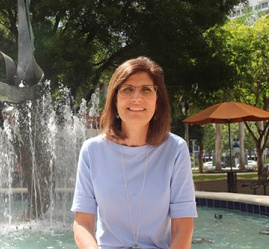Academic Medicine: Going Global to Improve Health Care

Physician-scientists are working globally to improve health care locally.
Dr. Richard K. Lee sometimes takes care of patients in a converted DC-10 aircraft equipped with operating and treatment rooms as well as a classroom where they broadcast lectures and surgical procedures. The ORBIZ Flying Eye Hospital is just one way Dr. Lee, an ophthalmologist who specializes in glaucoma and cataracts at the top-ranked Bascom Palmer Eye Institute, and other University of Miami Health System physicians incorporate a global perspective on the delivery of medical care.
“Whenever I travel, wherever I go, I make it a point to visit the local eye hospital to see how they operate,” says Dr. Lee. “My purpose is to ask questions. What do they have that we don’t have? What can we do better? What can we learn from them?”
His lab team includes two research fellows from China — and a third one who is about to arrive — who hope to develop strategies to prevent the blindness associated with glaucoma.
Dr. Lee is just one of the UHealth physician-scientists who regularly cross borders to learn new techniques, teach colleagues, and treat patients who have limited access to care in their countries.
As technology and ease of travel shrink the world, researchers have been busy building alliances in countries near and far.
While international collaboration between researchers is not new, UM president Julio Frenk, who is also a physician and a former Mexican secretary of health, raised the bar when he arrived in 2015, urging faculty to take advantage of the university’s geographical location as a gateway to Latin America. One of his strategic objectives is to make the University of Miami a hemispheric institution through collaboration in research and educational exchange. UHealth is well on its way to doing this.
“We are working to develop partnerships with leading institutions in the region so we can learn from each other and work together to address the gaps we have in outcomes today in our communities,” says Dr. Gilberto de Lima Lopes, associate director of Sylvester Comprehensive Cancer Center’s Global Oncology program.
For example, Dr.s Ricardo Jorge Komotar and Michael Ivan, neurosurgeons at Sylvester Comprehensive Cancer Center and the University of Miami Health System, recently launched an international neuro-oncology scholars program. Starting this fall, two neurosurgeons will spend two weeks each in Australia with Dr. Charlie Teo, a renowned neurosurgeon who specializes in minimally invasive techniques. Then in the spring, they will spend an additional two-week rotation with a separate international specialist in awake surgical mapping.
“This is a way of adding to our skillset,” says Dr. Ivan, who is also co-director, with Komatar, of Sylvester Brain Tumor Initiative. “The same kind of tumors are treated differently around the world, and learning the best techniques from around the world will only continue to improve our care and teaching here at UM.”
While this international fellowship will help UHealth neurosurgeons expand their proficiency, another program brings young Latin American neurosurgeons to study under UHealth luminaries. The first one, from Argentina, started last year. In addition, UHealth faculty will be offering two-week courses to neurosurgeons from South America and Central America twice a year.
“It’s a two-prong approach,” says Dr. Komotar. “We have our fellows spending time with experts who specialize in niche areas and then bringing back that expertise. At the same time, we’re sharing our knowledge and experience with others.”
In the end, patients are the winners.
“This improves care, and it also helps in recruiting the best neurosurgeons to our program,” Dr. Ivan adds.
Dr. Chad R. Ritch, a urologic oncologist at Sylvester Comprehensive Cancer Center, and his colleagues train fellows from India and Latin America for up to three years of hands-on experience. Some of these trainees are research fellows who work on projects that are often published in medical journals, while others are clinical fellows who learn how to perform robotic surgery and other complex urological procedures. They then return to their home countries to apply those skills. In some cases, patients from abroad, most of them from the Caribbean and Latin America are referred directly to the Urology faculty. These patients typically fly in for robotic surgery for prostate cancer.
Dr. Ritch also travels to Jamaica to participate in a mobile prostate cancer screening research program. There’s a lack of awareness about the necessity for such screening on the island, he explains, and “Jamaican men tend to present later with more advanced stages of the cancer.”
Making such screening widely available can go a long way towards early detection, potentially treating the cancer before it becomes deadly.
Giving back to communities in the Caribbean helps patients in South Florida, too, as there is a sizable Caribbean diaspora here. Dr. Ritch, who is associate director of UHealth International program, has found an increased acceptance and knowledge of prostate cancer screening among the South Florida Caribbean population.
“Some of them have heard about the [screening] program from relatives [in Jamaica] or knew about it themselves when they came over,” he says.

Collaborating with a fellow physician who has complementary expertise enriches not only academic research but also expands clinical methods. This is particularly helpful in rare diseases when one physician might see only a handful of cases, and therefore might not be as aware of innovative or experimental treatments.
International collaboration can take different forms, but usually, it involves research, training, and delivery of health care, says Dr. Mario Stevenson, UHealth chief of the Division of Infectious Disease. Dr. Stevenson and his team have been working on HIV research with IRSICaixa AIDS Research Institute in Barcelona, aiming to find a vaccine for the virus ultimately. The 10-year research project focuses on how the HIV 1 infection remains incurable because it manages to stay hidden from the body’s immune system. The two groups of researchers decided to join forces soon after IRSICaixa became interested in one of the detecting techniques developed by UHealth researchers.
“It’s driven by common interests and the possibility that others have clinical samples that we don’t have here,” says Dr. Stevenson.
Such partnerships benefit both institutions by sharing resources and knowledge that working alone could not confer.
“You end up developing a faculty that has global expertise and trained not only in their own specialty but also in new methodologies and new technologies.”
Miami’s unique geographic location, as a bridge between the Americas, challenges scientists and doctors to take into account “the diverse local population that is closely connected with the Caribbean” and Latin America, says Dr. Ritch.
“We as physicians need to have a good understanding of these cultures,” he adds.
UHealth infectious disease experts have also developed a teaching relationship with faculty at the University of Sao Paolo. Since 2007, fellows from Brazil have taken courses from UM faculty in an effort “to learn all you need to know about HIV.”
In addition, researchers in both Miami and Sao Paolo have studied the Zika-carrying A. aegypti and the malaria-causing A. cruzii mosquito populations in São Paulo City. These studies have explored how these insects adapt to urbanization, including chemical control. Such research is vital to develop more effective control programs.
Partnerships are essential for advancing knowledge in the medical field, too.
They allow countries that might not have their own resources to learn from institutions and countries that do. In this vein, Bascom Palmer hosts the annual CURSO, a course that attracts hundreds of ophthalmologists from Latin America and the Caribbean. Topics include macular degeneration, LASIK, cataracts, eye cancers, glaucoma — pretty much every specialty in the field. The eye institute also sends its physicians to various Latin American countries to teach mini-courses.
Patients come from all over the world to be treated by UHealth physicians. “It’s important that when they return to their countries, they get the quality care by physicians who we have trained,” Dr. Lee says. “it’s a way of building bridges.”

Ana Veciana-Suarez, Guest Columnist
Ana is a regular contributor to the University of Miami Health System. She is a renowned journalist and author, who has worked at The Miami Herald, The Miami News, and The Palm Beach Post. Visit her website at anavecianasuarez.com or follow @AnaVeciana on Twitter.
Tags: academic medicine, brain tumor care in Miami, Brain Tumor Initiative, Dr. Chad Ritch, Dr. Mario Stevenson, Dr. Michael Ivan, Dr. Ricardo Komotar, Dr. Richard K. Lee, global oncology, Sylvester Comprehensive Cancer Center
